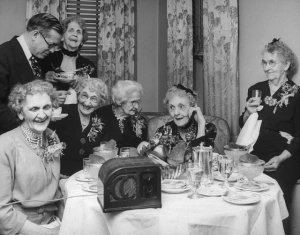 Turns out, Al Capone played golf. I learned this on the deck of a trailer in Northern Arizona from my friend, Joan. Joan’s father had caddied for him.
Turns out, Al Capone played golf. I learned this on the deck of a trailer in Northern Arizona from my friend, Joan. Joan’s father had caddied for him.
Joan is a sex-bomb of a 67-year-old with the body of a 25-year-old who works out every day and regularly whomps me at tennis.
Joan says her father told her that Al Capone kept a sawed-off shotgun in his golf bag—just in case. Mark Dee writes that Capone once “accidentally shot himself in the foot by setting off a revolver in his golf bag as he rummaged for a club.”
Al Capone tipped well and ate his vegetables. Joan’s grandmother, who kept a garden, had a basket of fresh vegetables ready for Mr. Capone, who would stop by on his way home from the golf course. “He was a very nice man,” her grandmother said.
“People are trapped in history and history is trapped in them.”
James A. Baldwin

A few times a year, because grandparents I never met came from Russia— or more specifically, from Grodno, Belarus—just before the Russian Revolution, I make borscht. My late father learned Russian and I learned Russian and my teenage son is learning Russian, all of us in obeisance to history, or to genealogy, and to an earthy, blood-red soup.
Borscht is an all day process, at least for me, with the washing and baking and peeling of beets, the grating of cabbage, and the chopping and chopping of said beets and carrots, potatoes and dill. Of course, before all of that, there is the long grocery list, including lemons and prunes, tomatoes and onions, skip the bell pepper.
I decided to kick it up a notch this year, and make my broth from scratch. At the butcher counter I explained I needed soup bones. I had no idea what a soup bone looked like. An elderly Italian man was standing next to me. “What are you making?”
“Borscht.”
“Borscht? Are you Russian?”
“Well, my grandparents . . . ”
When the butcher handed me a packet of small bones wrapped in plastic my companion scoffed.
 “Those are not the bones you need.” Handing the packet back to the butcher he said, “Give her some big marrow bones.”
“Those are not the bones you need.” Handing the packet back to the butcher he said, “Give her some big marrow bones.”
While we waited, he told me, “In the fifties I was a policeman in Italy, and it was my job to take Russians who had escaped back to Russia.”
“Jeez,” I said with my usual eloquence. “I guess it didn’t turn out well for those guys.”
“No, probably not.” The butcher reached over the counter with a bone as big as my forearm. “She needs more than that,” the Italian told him— my companion who took Russian emigres back to Stalin or Krushchev, sentencing them to a labor camp if not death. Here history was trapped in a kind stranger concerned about how my broth would turn out.
My husband is reading God’s Eugenicist, because he is a disciplined reader of history. I am a disciplined reader of the first fifty pages of history books. Since his boss is a German citizen, my husband decided to bring up the delicate topic with him. You know, “Eugenics,” that elephant in the room when you have a German boss.
I shall call his boss Rolf. Rolf did his Zivildiesnt in a German mental hospital. Of all the patients, there were none who had been alive prior to 1945. They had all been exterminated by the Nazis, all but one woman. Now in her nineties, she is alive because she was a talented seamstress. The SS would leave their uniforms with her, and she would repair them swiftly and expertly, her usefulness saving her life. (She did not escape forced sterilization.) She is still in the mental hospital, still practicing the sewing that saved her.

History is trapped in us, in the soup we make, in the stories we tell, in the stranger at the grocery store. Al Capone tossled Joan’s father’s head, handed him a $5 bill and planned the Valentine’s Day Massacre. And he appreciated a good tomato.


You make very interesting connections between the “ying and yang” of some powerful historic figures. Good food for thought, along with your borscht.
LikeLike
Glad you liked it.
LikeLike
Now you’ve made me want borscht. Oh yes, the writing was lovely.
LikeLike
Well, it’s good weather for borscht. Thanks for reading.
LikeLike
enjoying the blog…
LikeLike
Thanks for reading, Sue.
LikeLike
Borscht brought back good childhood memories for me in hong kong. I always ordered that when it is on the menu. You and Joan have great connection!
LikeLike
I changed my mind and would enjoy going with you to Russia and eat borscht there.
Not afraid of Putin.
LikeLike